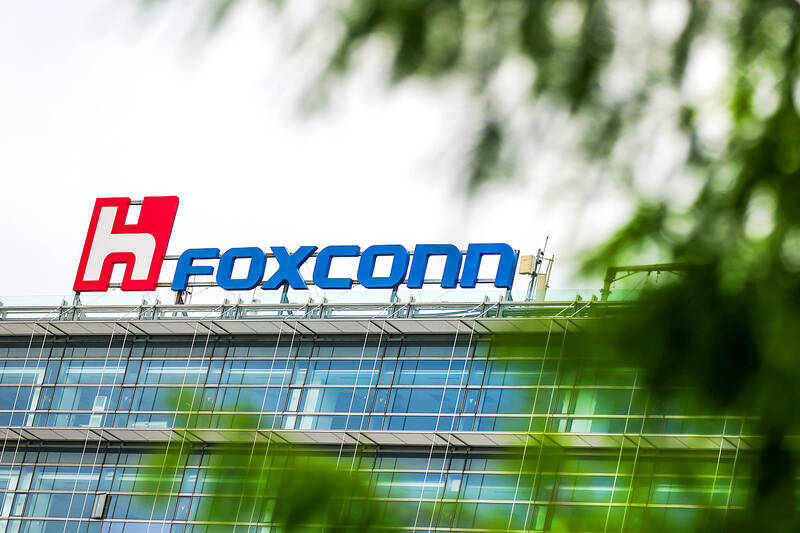Four people working for Foxconn in China have been detained, the Mainland Affairs Council said yesterday, describing the circumstances as “quite strange.”
The employees were detained in Zhengzhou for what is the equivalent of “breach of trust” under Taiwan law, it said.
“The circumstances surrounding this case are quite strange,” the council said.

Photo: Ritchie B. Tongo, EPA-EFE
Foxconn “has declared that the company suffered no losses, and the four employees did not harm the company’s interests in any way,” it said, without providing details about when they were detained, their nationalities or their roles.
Foxconn, known in Taiwan as Hon Hai Precision Industry Co, is the world’s biggest contract electronics manufacturer and assembles devices for major tech companies, including Apple.
Most of its factories are in China, including in Zhengzhou, which has been dubbed “iPhone City,” as it is home to the world’s biggest iPhone factory.
The four detainees were Taiwanese, said the Straits Exchange Foundation, a semi-official body in Taiwan that handles people and business exchanges with China.
The case “might involve corruption and abuse of power by a small number of public security officials, which has severely damaged business confidence,” the council said. “We urge relevant authorities across the Strait to investigate and address the matter promptly.”
A Foxconn spokesman declined to comment when contacted by AFP. The Chinese minister of foreign affairs did not immediately respond to AFP’s request for comment either.
Chinese regulators last year conducted tax audits and reviewed land used by Foxconn when company founder Terry Gou (郭台銘) bid to become president of Taiwan. A Foxconn subsidiary was later handed a 20,000 yuan (US$2,831) fine for overstating expenses. It is still unclear whether Chinese regulators have completed their probe into Foxconn.
Beijing has taken aggressive actions against the staff of foreign firms in recent years, as tensions with the US and its allies mount, spurring concerns about the safety of employees at multinational firms.
An executive at Japanese drugmaker Astellas Pharma Inc was indicted for espionage in August. Before that, Beijing fined US-based Mintz Group about US$1.5 million for illegal data collection, months after officials raided its offices and detained five of its Chinese employees.
More similar incidents took place last year.
American consultancy Bain & Co said Chinese authorities questioned staff at its Shanghai office. Officials also publicized a raid at Capvision, a consulting firm headquartered in New York and Shanghai, accusing the company of abetting espionage efforts by foreign forces. Authorities also detained an executive and two former employees of WPP PLC, one of the world’s biggest advertising companies.

Taiwanese can file complaints with the Tourism Administration to report travel agencies if their activities caused termination of a person’s citizenship, Mainland Affairs Council Minister Chiu Chui-cheng (邱垂正) said yesterday, after a podcaster highlighted a case in which a person’s citizenship was canceled for receiving a single-use Chinese passport to enter Russia. The council is aware of incidents in which people who signed up through Chinese travel agencies for tours of Russia were told they could obtain Russian visas and fast-track border clearance, Chiu told reporters on the sidelines of an event in Taipei. However, the travel agencies actually applied

Japanese footwear brand Onitsuka Tiger today issued a public apology and said it has suspended an employee amid allegations that the staff member discriminated against a Vietnamese customer at its Taipei 101 store. Posting on the social media platform Threads yesterday, a user said that an employee at the store said that “those shoes are very expensive” when her friend, who is a migrant worker from Vietnam, asked for assistance. The employee then ignored her until she asked again, to which she replied: "We don't have a size 37." The post had amassed nearly 26,000 likes and 916 comments as of this

New measures aimed at making Taiwan more attractive to foreign professionals came into effect this month, the National Development Council said yesterday. Among the changes, international students at Taiwanese universities would be able to work in Taiwan without a work permit in the two years after they graduate, explainer materials provided by the council said. In addition, foreign nationals who graduated from one of the world’s top 200 universities within the past five years can also apply for a two-year open work permit. Previously, those graduates would have needed to apply for a work permit using point-based criteria or have a Taiwanese company

The Shilin District Prosecutors’ Office yesterday indicted two Taiwanese and issued a wanted notice for Pete Liu (劉作虎), founder of Shenzhen-based smartphone manufacturer OnePlus Technology Co (萬普拉斯科技), for allegedly contravening the Act Governing Relations Between the People of the Taiwan Area and the Mainland Area (臺灣地區與大陸地區人民關係條例) by poaching 70 engineers in Taiwan. Liu allegedly traveled to Taiwan at the end of 2014 and met with a Taiwanese man surnamed Lin (林) to discuss establishing a mobile software research and development (R&D) team in Taiwan, prosecutors said. Without approval from the government, Lin, following Liu’s instructions, recruited more than 70 software